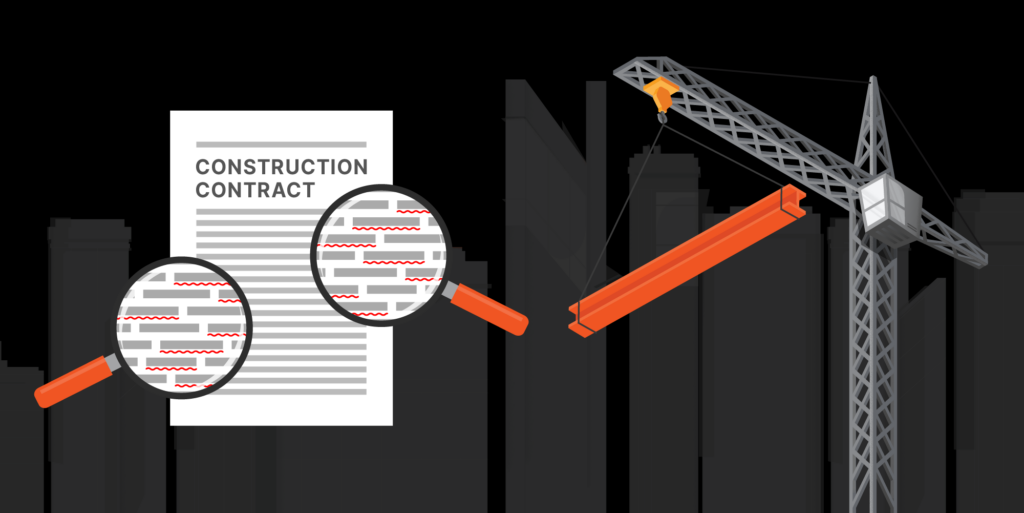— 11 min read
A Deep Dive on Breach of Contract in Construction

Last Updated Dec 10, 2024

Matt Viator
Matt Viator, Counsel for Procore Technologies, a Louisiana native who's settled in New Orleans after a brief stop in Baton Rouge. Matt joined the Levelset (a Procore Company) team as a 2016 and is a licensed Louisiana attorney with a J.D. from Tulane University Law School. Matt has extensive construction law knowledge surrounding contracts, payments, and more.
Last Updated Dec 10, 2024

The term "breach of contract" gets thrown around all the time in business, and especially so in the construction industry. Read on for a thorough discussion of breach of contract, major vs. minor breaches, how to bring a breach of contract claim — and how to respond to a breach of contract claim.
Table of contents
What 'breach of contract' means
Before we dive too deep into what a breach of contract is, let's review what a construction contract actually is: A contract is an agreement between two or more parties to do something, usually in exchange for payment. There must be an offer, an acceptance, consideration, and a mutual understanding that the parties intend to be bound by the terms of the contract.
Now onto "breach of contract." A breach of contract occurs when a party fails to uphold one of their contractual obligations. They were required to do (or not to do something) and failed to do so. The definition is that simple
Major (material) vs. minor (non-material) contract breaches
When we think of the term "breach of contract." our brains typically go straight to lawsuits. When a contract has been breached, some type of damages may be necessary — and a lawsuit might end up taking place. However, not every breach is worth creating a legal ruckus. Beyond that, small variances from the contract might not even result in damages.
1. Major (material) contract breaches
Obviously, some breaches are a big deal. When either party strays pretty far from what they're required to do under the contract, it could result in a material breach. Ideally, these issues can be resolved before legal action becomes necessary.
But, when you hear about a breach of contract lawsuit, typically that means a material breach is in play. It will be up to the court to determine whether a breach is truly material, but it's usually pretty obvious when an issue constitutes a material breach of contract. That and the contract may even specify what is considered "material".
Examples of a material breach of contract
Straying from the project plans will often result in a material breach. Using substandard materials (or materials that are obviously inferior to the ones required by contract) could result in a material breach. Failing to make payment could cause a breach (more on payment disputes below).
2. Minor (non-material) contract breaches
Not every deviation from the contract terms is a huge problem. Sure, technically there may still be a "breach of contract", but non-material breaches might not make a whole lot of difference at the end of the day. When a minor, non-material breach has taken place, someone might throw a fit — but these types of breaches won't (or at least shouldn't) ruin an entire job.
Examples of a non-material breach of contract
Actions such as using a different brand of material than specified in the contract might be a minor breach (as long as the quality is relatively similar). Showing up to the job site just a little bit late could be a non-material breach. Small variations in color might be considered a non-material breach as well if the variation isn't particularly noticeable or drastic.
Stay updated on what’s happening in construction.
Subscribe to Blueprint, Procore’s free construction newsletter, to get content from industry experts delivered straight to your inbox.

3 common causes for breach of contract in the construction industry
Construction contracts can be long, intricate documents depending on the size of the project. A well-drafted one will account for any possible occurrence that can happen on the project, and outline how to deal with the situation. However, there are 3 common occurrences that can cause a construction contract to be breached.
1. Defective performance
Arguments over workmanship happen all the time. And those arguments over defective work can be long, drawn-out, and expensive disputes. But again, a minor deviation from the plans or the contract won't necessarily give rise to a material breach. If a breach is minor and can be easily managed, it might not be worth the battle.
2. Schedule and delay issues
Construction is a process — and each trade is dependent on the one before it. On top of that, there are tons of other factors in play, not the least of which is the weather. Falling behind schedule might not be ideal, but it might not be a breach either. That'll come down to the terms of the contract, particularly if there is a "no damages for delay" clause.
Learn more: Construction Delays: Types, Claims, & Defenses
3. Failure to perform
This one's fairly simple: Failing to perform can result in a breach. Construction is a process. Any single party's failure to perform has a ripple effect, and damages could quickly sprawl.
Potential remedies for breach of contract
When a contract has been breached, the non-breaching party who has been injured may be entitled to certain legal remedies, including:
- Damages
- Rescission
- Reformation
- Specific performance
Let's take a quick look at what each of these entails in a little more detail.
1. Damages
Damages are probably the most common remedy for a breach of contract, and it's typically what most claimants have in mind when they sue over a breach of contract. Essentially, damages = money. The amount of monetary damages that will be due to the injured party will depend on the specific circumstances, and there are a number of different ways that the damages could be calculated.
Damages for breach of contract come in three main forms:
- Compensatory damages are meant to compensate the aggrieved party for any actual damages or injuries that may have been incurred
- Punitive damages penalize the breaching party if their breach was intentional, egregious, or vindictive
- Liquidated damages are those specified in the contract for certain breaches where damages may be hard to calculate
2. Rescission
When rescission is used, it terminates the rights of the parties and attempts to put everyone in the position they were in prior to entering into the agreement. Rescission is also a common remedy used for breaches of contract since it doesn't require that the parties continue to work together.
3. Reformation
Reformation is sort of like a cousin to rescission. It doesn't require one side to outright pay the other, and it doesn't force the parties to carry on as if nothing ever happened. Under reformation, the agreement is "reformed" — meaning the agreement will be reinstated, though the obligations and duties of the parties will be altered from the original contract.
4. Specific performance
Specific performance isn't used all that often. It forces both sides to complete the contract as if the dispute had never happened. This will typically be used when using specially fabricated materials or other services contracted specifically for that party's skills or ability. Courts try not to force parties to work together once a breach has occurred. The relationship may already be damaged beyond repair (or at least beyond the point where you could just ignore a major dispute). Still, it happens.
How to bring a breach of contract claim
Not all contract disputes mean there is a breach. However, for some disputes, filing a breach of contract case might be necessary.
Before doing anything, check the contract. There may be a dispute resolution clause present that mandates alternative dispute resolution or some other in-house process. More creative and large-scale contracts may even contemplate a Dispute Resolution Board.
In order to recover under a breach of contract claim, typically, that means filing a lawsuit. Lawsuits can be expensive and risky, and that's yet another reason to talk it out before a dispute gets this far. When the damages are on the lower end of the spectrum, taking the issue to small claims court might work - but small claims court actions are limited to a certain amount (typically, the limit will be several thousand dollars).
If a breach of contract claim is brought, unless small claims court is an option, you'll probably need to hire a lawyer. It's almost never a good idea to represent yourself, and for businesses like LLCs and corporations, it might not be an option anyway. The good news here, being, that when an attorney looks at your claim and the surrounding circumstances - they can give you their opinion on the case and offer some legal advice on how to proceed.
Responding to a breach of contract claim
How to respond to a breach of contract will depend on a number of factors, and there's no single answer to the question "How should I respond to this breach?"
A few important things to consider might be:
- Is there an actual breach of the terms of the contract?
- Is the alleged breach material or non-material?
- How quickly can the breach be fixed?
- What's this breach going to cost?
- Who ultimately was the cause of the breach?
But again, it all depends on the specific situation. Still, two principles hold true:
1. A breach of contract won't necessarily entitle you to stop work or walk off the job.
First, just because the contract was breached in some way does not entitle either side of the contract to simply walk away from the deal. There are a lot of things to consider, and quitting or trying to fire someone will often do more harm than good. Specifically, walking off a job could actually result in a breach of contract!
Before deciding to take any action — look to the contract! It's there to provide guidance in these sorts of situations. Many agreements set out specific methods to resolve disputes and respond to issues. Going awry of the contract could put some of the blame — and potentially some of the damages — on the party who was injured in the first place.
2. Talking it out is the best option available
It may sound simple, but talking out your problems is still always the best option when it's still available. Where there's still a salvageable project or relationship, reaching out to the other side to try and fix the issue is probably the most efficient and least risky option. Even if one side is clearly at fault, and even if it may take some negotiating to make the issue disappear, smoothing out a dispute with a contractor or supplier will almost always cost less than replacing them — or fighting them in court.
Talking it out doesn't necessarily mean you have to be friends — but you do have to find a way to proceed with the job. Being right isn't enough in these situations, because it will still cost valuable time and money to prove that you're right (plus, you could lose).
Plus, before some action is taken, threatening to take that action is still an option. Construction disputes can quickly become a nightmare and a money pit so many parties will be keener on talking if they know the alternatives.
Can a construction payment dispute cause a breach of contract?
Payment terms are a part of the contract, just like anything else. However, sometimes, some parties feel like there's more flexibility regarding payments That's why a breach of contract claim can be quite the chicken/egg scenario when a breach is caused by payment problems.
Failure to make payment could be the source of a breach of contract. Another source could be that one party refuses to pay another because they feel the contract was breached.
Unless payment can specifically be withheld under the contract, failing to make payment according to the contract could result in a breach.
But even if a material breach of contract has occurred, that doesn't mean it's time to file a lawsuit, and it doesn't mean you can just walk off the job. In fact, stopping work can actually put the unpaid party in breach of their contract and compound the legal problems.
Trying to resolve the breach with as little impact as possible is almost always the right first step. Escalating the dispute may become necessary, but it shouldn't come as a knee-jerk reaction.
Failure to pay doesn't always cause a breach (but it usually does)
Every contract and every situation is different. It's entirely possible that, under certain circumstances, your customer's failure to pay won't result in them breaching the contract.
Two common topics that pop up in construction contract and payment disputes are pay-if-paid and pay-when-paid clauses. If these clauses are present and you're in an area that enforces them, nonpayment, partial payment, or slow payment might not even be in breach of the contract.
Essentially, pay-if-paid and pay-when-paid provisions will alter the requirement to make payment. A pay-if-paid clause will state that a customer doesn't have to pay a contractor if they don't receive payment. A pay-when-paid clause says that the customer doesn't have to pay a contractor until they receive payment. That may sound the same, but a pay-when-paid clause only shifts the time during which payment is made. A pay-if-paid clause could eliminate the requirement to make payment altogether if a customer isn't paid.
Courses about construction.
For construction.
Unlock your career potential with our free educational courses on Health & Safety, Data in Construction, and more.
Can filing a mechanics lien cause a breach of contract?
By and large, filing a mechanics lien does not cause a contract breach — on the side of the party filing the lien.
On the flip side, one of the many ways a mechanics lien works to force payment is that it can actually put pressure on the claimant's customer, the GC, and/or the project owner or developer. Often, a lending agreement, development agreement, or prime contract will state that the property must be kept free and clear of all liens.
If that's the case, and a sub-tier party does file a lien, extra pressure will be put on the higher-tiered parties to resolve the dispute. They may have to remove the lien, or they may be required to bond off the filed lien.
Was this article helpful?
Thank you for your submission.
85%
15%
You voted that this article was . Was this a mistake? If so, change your vote
Scroll less, learn more about construction.
Subscribe to The Blueprint, Procore’s construction newsletter, to get content from industry experts delivered straight to your inbox.
By clicking this button, you agree to our Privacy Notice and Terms of Service.
Thank you!
You’re signed up to receive The Blueprint newsletter from Procore. You can unsubscribe at any time.
Categories:
Written by

Matt Viator
Matt Viator, Counsel for Procore Technologies, a Louisiana native who's settled in New Orleans after a brief stop in Baton Rouge. Matt joined the Levelset (a Procore Company) team as a 2016 and is a licensed Louisiana attorney with a J.D. from Tulane University Law School. Matt has extensive construction law knowledge surrounding contracts, payments, and more.
View profileExplore more helpful resources

Using Standard Operating Procedures for Better Contract Management
Every construction project is different, meaning that GCs have to be continually agile and strategic about applying their experience. Major categories change from project to project, from the owner to...

Understanding Supplementary Conditions on Construction Contracts
No two construction projects are exactly alike — and the same goes for construction contracts. Even when using a standard contract form, owners and contractors sometimes use supplementary conditions to...

A Straightforward Guide to Construction Contract Review
Construction contracts are like the glue for the project team. They’re the ties that bind the working relationships and goals for the project, containing information about responsibilities, liabilities and processes...

Escalation Clauses in Construction Contracts: When and How They Apply
In construction contracts, an escalation clause allows for the escalation of a certain price for labor or materials to be used in a construction project. This type of clause is most...
Free Tools
Calculators
Use our calculators to estimate the cost of construction materials for your next project.
Templates
Find a template to help you with your construction project tasks.
Material Price Tracker
Get the latest U.S. retail prices and view historical trends for common building materials.
Glossary
Explore key terms and phrases used in the industry.
